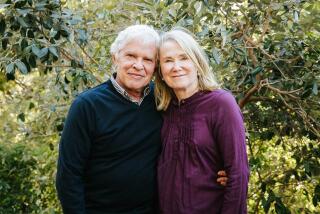Skirball founder Uri D. Herscher will retire. His successor is a civil rights lawyer
- Share via
The Skirball Cultural Center, one of the nation’s largest Jewish cultural institutions, will announce Wednesday that founding President and Chief Executive Uri D. Herscher will retire this summer and will be succeeded by L.A. civil rights attorney Jessie Kornberg.
Herscher has led the Skirball since its inception in the 1980s and public opening in 1996. In a 1996 interview with The Times, Herscher said he envisioned the Skirball as a place where divergent ethnic groups could convene. Under his leadership, the Skirball has grown to see more than 600,000 people each year.
Herscher called his years at the Skirball a “remarkable, fulfilling journey.” And at 78, he hopes to end his tenure “in good health with ample strength.”
Citing the spirit of Jewish tradition, Herscher said “it’s time for me to do as my mentors and teachers have done before me and that is to pass the baton to a new generation of leadership.”
Herscher was a mentor to Kornberg, 37, whom he met about five years ago.
“I was immediately struck by her intellect, her character, her vigor and her regard and respect for her own family history and ancestry, which includes the immigrant experience,” Herscher said. “Most of all, her commitment to pursuing social justice.”
Kornberg will begin her tenure July 1. Since 2014 she has led the L.A. nonprofit public-interest law firm Bet Tzedek, which provides free legal services to low-income individuals and families. During Kornberg’s tenure as president and chief executive, the law firm established a transgender medical-legal partnership and a family preparedness program responding to the deportation of undocumented parents.
Previously, she worked as a trial attorney at an L.A.-based law firm handling civil and white collar criminal litigation. There she chaired the firm’s pro bono program. Kornberg earned her J.D. from the UCLA School of Law.
Kornberg said she was grateful for the opportunity to transition from law to the arts.
“It was hard to imagine what would feel as important and significant and meaningful to me as the work I’m currently doing,” she said. “But when Uri approached me about the opportunity to succeed him at the Skirball, it was the first time that something stirred those same reactions for me.”
Kornberg said the Skirball’s mission, guided by American values and the Jewish tradition of “welcoming the stranger,” is “personally relevant.”
Tom Kiefer, who photographed items confiscated at the Mexico border, has his project “El Sueño Americano” on view at the Skirball Cultural Center.
Welcoming diverse groups of people through cultural programming is exciting, she said. “Having more people from different backgrounds feel they belong together is the most exciting thing about the Skirball’s work.”
As president and CEO of the Skirball, Kornberg plans to draw from her legal experience to create a gathering for people “who think about migration and immigration — both from an arts and culture perspective but also from a civic engagement perspective.”
Herscher hopes Kornberg can expand the institution’s vision. “I wish her to apply her own lenses on the world as she sees it,” he said, “and make sure that our programs remain vital and relevant to generations yet to come.”
More to Read
The biggest entertainment stories
Get our big stories about Hollywood, film, television, music, arts, culture and more right in your inbox as soon as they publish.
You may occasionally receive promotional content from the Los Angeles Times.











